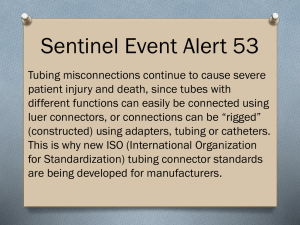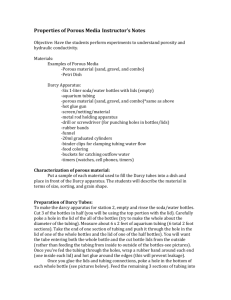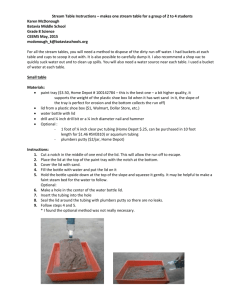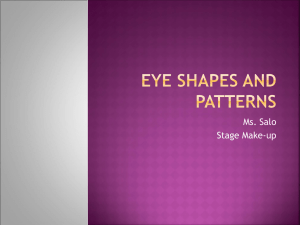presentation source - Mounir Bashour MD CM PhD
advertisement
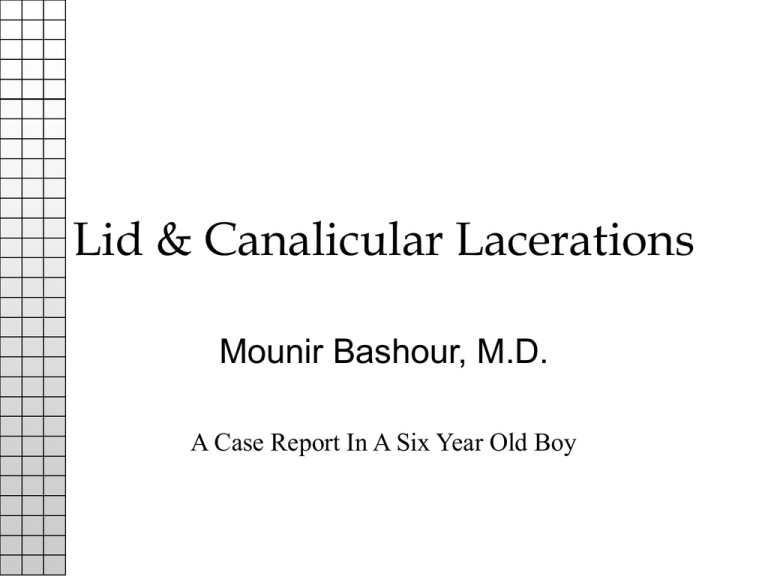
Lid & Canalicular Lacerations Mounir Bashour, M.D. A Case Report In A Six Year Old Boy Introduction • A short presentation to stimulate a discussion on a practical approach to complex lid/canalicular lacerations. • By Mounir Bashour, PGY-3, Ophthalmology, George Washington University, graduate of McGill Medical School. Case Presentation/HPI • 6 yo bm presents with complex lid laceration OS. • Secondary to falling from upper bunk bed while playing around 2 AM 7/20/95. • Hx of Prematurity (28 weeks) was in NICU for 3 months, no Hx of ROP. • Currently good health, no meds, allergies • Single parent (father) family. Examination • >4 cm full thickness medial oblique upper lid laceration OS extending into medial canthus. • PERRLA, no RAPD. • Va 20/30 OU by Snellen. • Rotations full, ortho. • No corneal abrasion, Seidel negative. • Dilated exam reveals picture consistent with resolved early ROP. Photo of Upper Lid Laceration • Photo with similar laceration as found in our patient. Diagnosis • Suspicion • Common etiologies • Epidemiology Necessity of Repair • Controversy • Jones study • Moore and Linberg study Timing of Repair • Immediate vs late Discussion I • The aim of lid repair • Workup Discussion II • Blunt injuries Discussion III • Lacerations involving the canthal angles Intraoperative Complications • Inabilty to Locate the Medial End of the Canaliculus • Difficulty Retrieving Probe from Nose • Problems Suturing the Canalicular Walls • Difficulty Repairing Medial Canthal Ligament Injury Proximal Canaliculus • The characteristic appearance of the proximal canaliculus Normal Anatomy of the Lacrimal System • Essential knowledge Intubation • Gavaris Modification of the QuickertDryden procedure Anastamosis of the Canaliculus • Problems with suturing Medial Canthal Ligament Injury • Correct Placement of MC Fixation Suture • (A) Posterior reflection of MCT behind the lacrimal sac • (B,C) Correct fixation point Intubated Nasolacrimal System • Double-knotted Silastic Tubing Complications With Silicone Tubes • • • • • Tube displacement Punctal/canalicular erosion/slitting Conjunctival/corneal irritation Granuloma formation Epistaxis Displaced Tubing • Most common complication Securing the Tubing • One method of several Erosion • Six knots with 4-0 nylon woven into knots • Secured to lateral vestibule of nose Granuloma • Granuloma formation from silicone tubing • Displaced silicone tubing after patient had caught tubing with finger and pulled loop onto cheek Rarer Complications • • • • • Dacryocystitis Epiphora Ectropion Loss of tubing Difficulty removing tubing


